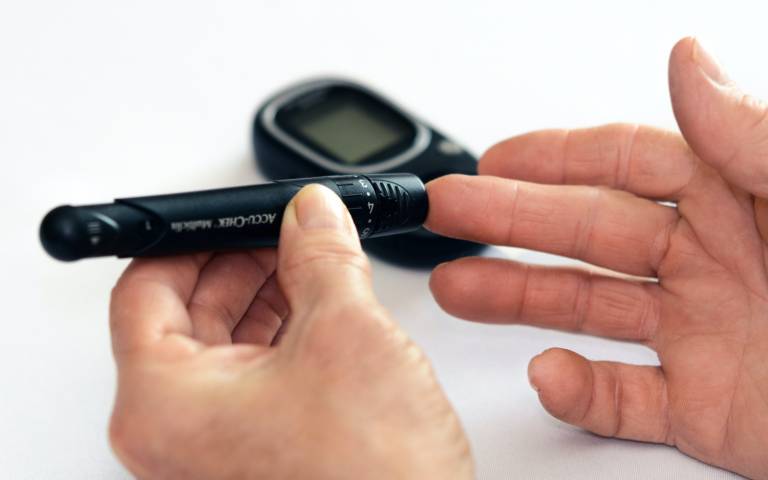Higher Covid-19 risk for middle-aged people with type 2 diabetes
16 February 2021
A large-scale analysis involving UCL and funded by Diabetes UK has found a disproportionately higher Covid-19 death risk in middle-aged people with type 2 diabetes, raising questions over vaccination strategies across Europe.

The study, published in the journal Diabetologia, found that compared to people of a similar age without type 2 diabetes, the additional COVID-19 mortality risk from having type 2 diabetes increases the younger someone is. Although the risk is low in absolute terms, the increase has a significant potential to impact middle-aged people particularly, as it elevates their existing age-related risk of COVID-19. For example, a person aged 50 with type 2 diabetes has the equivalent COVID-19 mortality risk of a 66-year-old person without diabetes: an additional risk of 16 years. This difference reduces with increasing age, so that the COVID-19 mortality risk of a person aged 70 with diabetes is similar to that of someone without diabetes aged 78: an additional risk of eight years.
While some countries such as the UK and Germany already prioritise people with type 2 diabetes for vaccines, this is not being consistently applied across comparable countries including many in Europe.
The team accessed published data from three UK studies, including tens of millions of people in the community and in hospital across the country (the datasets included two population-based studies, QResearch and OpenSAFELY, as well as the COVID-19 Hospitalisation in England Surveillance System (CHESS) cohort).
Dr Bilal Mateen (UCL Institute of Health Informatics and Wellcome) a co-author of the paper, said: “These important findings came from analysing large, anonymised datasets of tens of millions of people. This digital infrastructure was only possible thanks to the big investments the UK has made in this area. It is vitally important that we take a moment to reflect upon how we intend to sustain and grow these tools, given their potential for improving our understanding of disease and in helping us to protect populations.”
Dr Andrew McGovern, of the University of Exeter Medical School, who led the research, said: “The risk to middle-aged people with diabetes of dying from COVID-19 is very low in absolute terms compared with the elderly. However, vaccine roll-out across Europe should be done in order of risk. Strategies to define priority groups for vaccination must consider the disproportionate relative risk of COVID-19 mortality in middle-aged people with type 2 diabetes whose COVID-19 risk is already elevated by their age. We recommend that anyone with diabetes takes up the vaccine as soon as it’s available to them.”
The research team, which involved the University of Warwick, the Alan Turing Institute as well as UCL and the University of Exeter, looked at differences in the risk of dying from COVID-19 by both age and whether or not a person has diabetes – which was predominantly type 2 diabetes.
Bridget Turner, Director of Policy Campaigns and Improvement at Diabetes UK, said: “We know that people with diabetes have been disproportionately affected by coronavirus throughout this pandemic, and that the majority of those who have become seriously ill or died have been of older age. This new research funded by Diabetes UK gives important new insights into how much type 2 diabetes adds to the overall risk of dying from coronavirus at different ages, particularly the additional risk that the condition adds in middle-age.
“The UK has made good progress on prioritising those who are most vulnerable for vaccination – which includes all adults with diabetes – but we need to continue to work at pace to identify and protect those individuals at higher risk. At Diabetes UK we believe we can best do this by rolling out across the NHS the tool for assessing individual COVID-19 risk, which was promised, but so far, has yet to materialise.
“The most important thing anyone with diabetes can do to reduce their risk is to avoid catching the virus in the first place by continuing to social distance, wash hands and wear masks and to take a coronavirus vaccine when offered one.”
Links
- Research letter in the journal Diabetologia
- Dr Bilal Mateen’s research profile
- UCL Institute of Health Informatics
- UCL Population Health Sciences
Image
Photo by PhotoMIX Company from Pexels
Media contact
Mark Greaves
T: +44 (0)7990 675947
E: m.greaves [at] ucl.ac.uk
 Close
Close

